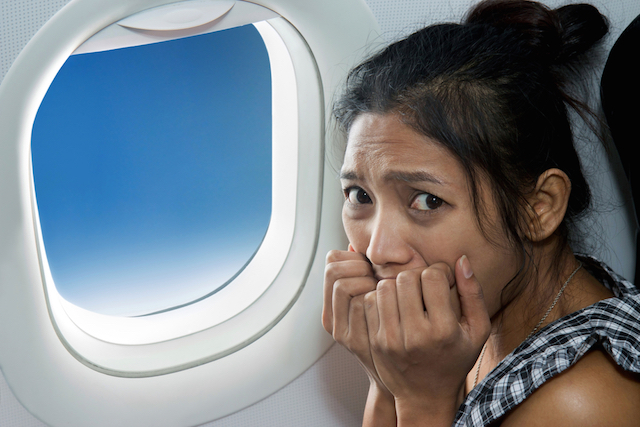
Written by Green Diva Maryam Heinen
You read that right: pesticides on planes!
How many of you have felt sick following a flight, only to chalk it up to a virus or sinus infection you caught from a fellow passenger?
What if I told you that you may have been poisoned by pesticides on the plane without knowing it?
If you have a fear of flying, the terror just catapulted to a whole new level.
While booking my ticket to Rome, Italy a few weeks ago, the agent quickly read a TSA disclaimer that had me do a double take. So much so, that I stopped her in her tracks and asked her to repeat herself. Basically, if I wanted to travel, I had to agree to the airline’s right to apply pesticides on the plane. In other words, I had to willingly agree to be exposed to poisons.
The routine procedure is called Disinsection. A seemingly made up word.
“Disinsection is permitted under international law in order to supposedly protect public health, agriculture, and the environment,” states the Department of Transportation.
According to The World Health Organization (WHO) and the International Civil Aviation Organization, certain aircraft cabins are sprayed with a ‘quick-acting insecticide’ immediately before take-off, while passengers are on board.
Alternatively, they sometimes treat the interior of the aircraft before passengers come on board, using a “residual-insecticide aerosol.”
Lastly, they also can apply “residual insecticide to all internal surfaces of the aircraft, except those in food preparation areas.” So breathe deep and make the most of that recycled air!
Chemical attacks amid the friendly skies
I personally don’t think being subject to a pesticide spray while I am stuck in a pressurized cabin is protecting my health; it’s just the opposite—it’s an assault. What happens to people with asthma or someone like me who suffers from an auto immune condition and is uber sensitive to chemicals?
When I started sharing my findings, it didn’t take long to find a victim. “I’ve been feeling like crap ever since I arrived,” says Heather Greene, a farmer and graduate student in Food Systems and Social Justice at Marylhurst University in Oregon. She is taking the critical food studies program at GustoLab International Institute with me in Rome. “My ankles got swollen and I still feel like a have a sinus infection. When I did some research I found out that I was suffering similar symptoms to others who had come into contact with insecticides on planes.”
Reported symptoms include acute respiratory and sinus problems, rash/hives, headache, and anaphylactic shock, as well as chronic immune, respiratory, and neurological problems.
If you are a passenger concerned about exposure or feel unwell after being sprayed while on an aircraft for disinsection, the WHO really downplays concerns and symptoms, and denies any link between illness and airline spraying. Their website states that there’s “no evidence that the specified insecticide sprays are harmful to human health when used as recommended.”
Meanwhile, individual airlines then use the WHO to justify their actions, stating things like, “Well WHO says disinsection is safe.”

I say WHO cares?
Large amounts of a mild poison, in an enclosed space over long periods of time? Do we really need science’s input on this one?
The most widely used pesticides for aircraft cabins are synthetic pyrethroids, particularly the chemicals d-phenothrin or permethrin. These are synthetic variations of a chemical found in the chrysanthemum that kills by interfering with insect nervous systems.
And they do effect human health, and not in a positive way. Take the prison guard who developed strange symptoms after being exposed. Also, multiple studies have revealed a link between permethrin and Parkinson’s disease.
“With little ventilation and in such a closed space, spraying pesticides on airplanes while passengers are still on board is troubling, particularly for sensitive groups like children, pregnant mothers, the elderly, and those with chronic conditions,” says Drew Toher Public Education Associate at Beyond Pesticides.
“Even if people are not present during spraying, pesticides applied in such an environment present a risk of residual exposure.”
Think about it. Passengers and employees sealed in a chamber that has been gassed for hours.
According to an article I found, Dr Jai Kumar, a neurologist and director of the Primary Stroke Centre at Baylor Hospital in Texas, recently stated that the spraying of pesticides on planes with chemicals like phenothrin, a neurotoxin, carries the risk of causing cancer and auto-immune diseases as lupus, Parkinson’s disease and memory loss among others.
Residual disinsection has been found to pose a hazard to flight attendants. Meanwhile, Beyond Pesticides wrote a story a few years ago about a flight attendant for Quantas who was suing the company, blaming required pesticide spraying for resulting in his Parkinson’s diagnosis.
Unfortunately, when airline employees try to get compensation, it’s often denied on the grounds they can’t prove the pesticide exposure has caused the condition. This is a site that supposedly was collecting signatures on behalf of victims, however it is blocked for me personally, while I write this from Italy. If someone has access, leave a comment about it.